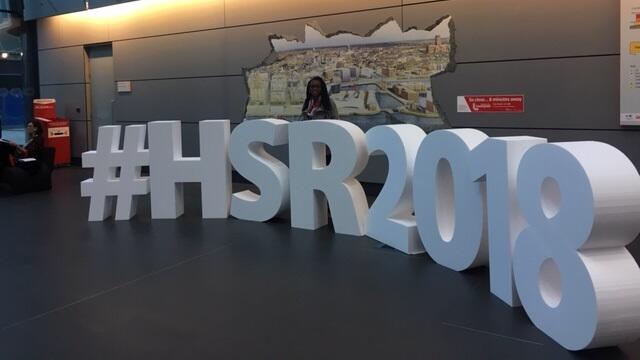
By Brenda Mungai. PhD student. Impala
Liverpool was host to the fifth Global Symposium on Health Systems Research (HSR) on 8th-12th October 2018. The theme was “Advancing health systems for all in the SDG era” quite befitting to a city with a rich history in public health; Liverpool School of Tropical Medicine, was the first school of tropical medicine to be set up, and Liverpool had the first Medical Officer of Health in Europe. Indeed, a city with rich heritage to be advancing health for all.
The symposium coincided with celebration of two anniversaries of interventions that aimed at ensuring health for all. The first was the UK National Health Service (NHS) 70th anniversary. The second was the 40th year anniversary of the Declaration of Alma-Ata that called on governments and all players to protect and promote the health of all people. Primary health care was in 1978 identified as a key for health for all with health being declared as a fundamental human right and a call for involvement of other sectors especially the social and economic sectors.
Despite the efforts made in ensuring health for all, in 2018, the world still struggles on how to offer universally accessible, equitable health for all. NHS which in many ways is a model for the world on how a government can ensure health care for its citizens is also faced with many challenges including but not limited to health financing, health workforce, changing health care needs among others. Questions abound, will the Sustainable Development Goals be achieved by 2030 ensuring we leave no one behind? Will we ensure healthy lives and promote well-being for all at all ages? What are the challenges in achieving this and what are the suggested solutions? This is what the global symposium set out to address.
Four sub-themes were explored during the symposium: Leaving no one behind-health systems that deliver for all, Multisectoral action-looking beyond provision of health to act on other determinants of health, Engaging the private sector in an effort to move towards Universal Health Coverage and finally Community Health Systems as a means of improving access to health services.
As a student with interests in health policy research, across all themes I noted the frustration of researchers on ensuring evidence translates to policy. There were different point of views on how evidence uptake into health policymaking and health systems strengthening can be promoted. A number of issues arose from the discussions as follows:
Who should be involved? Traditionally there has been a view that the evidence to policy gap can be addressed through building of relationships and trust between the researchers and policy makers. While this is still key, it has emerged that more actors need to be involved in the process; communities, civil societies, implementers, media and donors. This will be important to ensure researchers are having the right conversations with the actors, they are seeking to answer the right questions, at the right time and forming the right partnerships.
How should the evidence be packaged? Evidence should be country tailored, context specific, rightly framed and fit for policy.When communicating the message to policy makers and other players, ensure the message is packaged clearly and simply, it should be brief and to the extent possible visual. Modelling of research findings was noted as an example of how research can be translated to the language policy makers may relate to.
Role of implementation research? This was a key area that could enable more evidence uptake as it addressees the know-do gap in real world settings. During the symposium there was a call for donors to fund more of this in a bid to address the evidence to policy gap.
Role of strengthening national capacity to use evidence for policy making? Close collaboration to ensure better alignment of research with policy priorities is important. In addition, there should be focus in building capacity of the stakeholders involved in the policy making process in knowledge translation and assimilating evidence into the policy making processes.
In conclusion, translating evidence to policy is still an area in need of strong inter-disciplinary and multidisciplinary learning and will be key to ensuring health for all! IMPALA is on the right track to offer solutions to this area of health systems strengthening as it aims to offer multidisciplinary research that can be translational. As a PhD student focused on health policy I will aim to contribute to the know-do gap by testing if operational modelling will be beneficial in helping policy makers with evidence-based decision-making in policy formulation. This will be my contribution to ensure we leave no one behind in advancing health care for all!